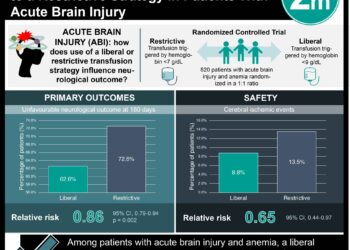High school football participation not linked with late life cognitive impairment or depression
1. In this study of a cohort of high school students from Wisconsin enrolled in 1957, participation in high school football was not associated with increased risk of cognitive impairment when compared to non-participants.
2. The risk of depressive symptoms at 65 years was lower for high school football participants compared to non-participants.
Evidence Rating Level: 3 (Average)
Study Rundown: Football remains one of the most popular activities for high school students in America. Recently there has been increased concern of cognitive impairment and mental health disorders from chronic traumatic encephalopathy that may be acquired from concussions and head trauma from playing football. The associated risk of football participation and neurocognitive deficits is difficult to estimate due to the reliance on limited autopsy series and recall bias with regards to football participation. The current study used data from a cohort of Wisconsin high school students from 1957 to evaluate the risks associated with high school football participation. The study found no observed association between football participation and cognitive deficit, depression, or alcohol use at the age of 65 years compared to all controls or subsets of non-sporting, and non-collision sports participants.
The study has several limitations, including high loss-of-follow-up rate, missing data on football participation for some students, and lack of data on important risk factors such as history of concussions both during football participation and at other points in life. The risks of football in 1957 may not be representative of high school football currently, though it is unclear if modern football would have higher or lower risk. The study has unique strengths including the prospective cohort design with longitudinally collected data, and data on confounders such as parents’ education level, and adolescent IQ.
Click to read the study, published in JAMA Neurology
Relevant Reading: Age of first exposure to football and later-life cognitive impairment in former NFL players
In-Depth [prospective cohort]: This study was comprised of a cohort originally recruited in 1957 and included 10 317 Wisconsin high school students. Data on football participation was based on systematic review of yearbooks. Students were excluded if they played a different sport with significant head trauma (hockey, wrestling). The primary outcomes, evaluated at the age of 65 years, included cognition based on scores on delayed word recall (DWR) and letter fluency (LF), and depressive symptoms as assessed by a modified Centre for Epidemiological Studies Depression Scale (CES-D).
Of the 4991 men in the study cohort, football participation data were unavailable for 20.4%, while primary outcome measures were unavailable for 31.0%. For the 2692 men included in the study, 834 played football. Cognition scores were not different for football participants (0.04; 97.5%CI –0.14 to 0.05; p = 0.37), while depressive symptoms were less compared to controls (–1.75; 97.5%CI –3.24 to –0.26; p = 0.01). Football participants were also not more likely to consume large amounts of alcohol at any time point measured.
Image: PD
©2017 2 Minute Medicine, Inc. All rights reserved. No works may be reproduced without expressed written consent from 2 Minute Medicine, Inc. Inquire about licensing here. No article should be construed as medical advice and is not intended as such by the authors or by 2 Minute Medicine, Inc.




![Reinnervation of cardiac infarcts decreases subsequent arrhythmia incidence [PreClinical]](https://www.2minutemedicine.com/wp-content/uploads/2015/02/1280px-Heart_ant_wall_infarction-75x75.jpg)

